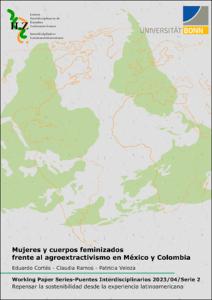Mujeres y cuerpos feminizados frente al agroextractivismo en México y Colombia

Mujeres y cuerpos feminizados frente al agroextractivismo en México y Colombia

| dc.contributor.author | Cortés, Eduardo | |
| dc.contributor.author | Ramos, Claudia | |
| dc.contributor.author | Veloza, Patricia | |
| dc.date.accessioned | 2024-01-16T15:54:57Z | |
| dc.date.available | 2024-01-16T15:54:57Z | |
| dc.date.issued | 16.01.2023 | |
| dc.identifier.uri | https://hdl.handle.net/20.500.11811/11245 | |
| dc.description.abstract | El presente artículo expone los impactos que ejerce el modelo agroextractivo sobre mujeres, cuerpos feminizados y sus territorios, usando como referencia tres tipos de monocultivos en México y Colombia. Metodológicamente este trabajo se posiciona desde el paradigma constructivista, con un abordaje interpretativo y cualitativo. Nos hemos cobijado en la Investigación Acción Participativa, revisión bibliográfica y citas de entrevistas propias de ejercicios etnográficos previos. El artículo se divide en dos secciones. La primera, aborda teóricamente las nociones de territorio-cuerpo-tierra, las manifestaciones del agroextractivismo y la relación que tienen éstos con los feminismos desarrollados desde una perspectiva latinoamericana. En la segunda sección, se exponen los tres casos de estudio: en Chiapas-México, los monocultivos de palma aceitera, en Madrid y Guasca-Colombia, los monocultivos de flores y de arándano. Finalmente, se enuncian algunos elementos emergentes en relación con las resistencias y luchas frente a este modelo agroexportador, junto con algunas conclusiones. | en |
| dc.description.abstract | Women and feminized bodies facing agro-extractivism in Mexico and Colombia This article uses three types of monocultures in Mexico and Colombia as a reference to the impact of the agro-extractive model on women, feminized bodies, and their territories. Methodologically, this work is positioned from the constructivist paradigm with an interpretive and qualitative approach. In the Participatory Action Research-IAP, we have used bibliographic review and quotes from interviews of previous ethnographic exercises. The article is divided into two sections. The first deals theoretically with the notions of territory-body-land, the manifestations of agro-extractivism, and the relationship they have with feminisms developed from a Latin American perspective. In the second section, the three case studies are exposed: in Chiapas-Mexico, oil palm monocultures, and in Madrid and Guasca-Colombia, flower, and blueberry monocultures, respectively. Finally, some emerging elements are enunciated in relation to the resistance and struggles against this agro-export model, together with some conclusions. | en |
| dc.format.extent | 19 | |
| dc.language.iso | spa | |
| dc.relation.ispartofseries | Working Paper Series Puentes Interdisciplinarios ; Serie 2, 04 | |
| dc.rights | Namensnennung - Nicht kommerziell - Keine Bearbeitungen 4.0 International | |
| dc.rights.uri | http://creativecommons.org/licenses/by-nc-nd/4.0/ | |
| dc.subject | Agroextractivismo | |
| dc.subject | mujeres y trabajo | |
| dc.subject | feminismos del sur | |
| dc.subject | soberanía alimentaria | |
| dc.subject | monocultivos | |
| dc.subject | agronegocios | |
| dc.subject | Agro-extractivism | |
| dc.subject | women and work | |
| dc.subject | southern feminisms | |
| dc.subject | food sovereignty | |
| dc.subject | monocultures | |
| dc.subject | agribusiness | |
| dc.subject.ddc | 300 Sozialwissenschaften, Soziologie, Anthropologie | |
| dc.title | Mujeres y cuerpos feminizados frente al agroextractivismo en México y Colombia | |
| dc.type | Arbeitspapier | |
| dc.identifier.doi | https://doi.org/10.48565/bonndoc-202 | |
| dc.publisher.name | Centro Interdisciplinario de Estudios Latinoamericanos (ILZ) | |
| dc.publisher.location | Bonn | |
| dc.rights.accessRights | openAccess | |
| dc.relation.url | https://www.ilz.uni-bonn.de/es/publicaciones/wps-puentes-interdisciplinarios | |
| ulbbn.pubtype | Zweitveröffentlichung | |
| dc.version | publishedVersion |




